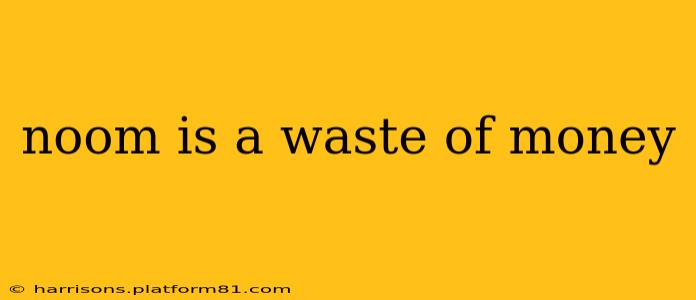Is Noom a Waste of Money? A Critical Look at the Popular Weight-Loss App
Noom's popularity has exploded, but is it worth the investment? Many users praise its comprehensive approach, while others find it overpriced and ultimately ineffective. This article dives deep into Noom's pros and cons, helping you decide if it's the right weight-loss solution for you. We'll explore its features, cost, and effectiveness, addressing common questions and concerns.
What is Noom, and how does it work?
Noom is a digital weight-loss program that combines elements of cognitive behavioral therapy (CBT), nutrition education, and social support. Unlike many diet apps, Noom emphasizes behavior modification and long-term lifestyle changes rather than quick fixes. It uses a points-based system to track food intake, incorporating a color-coded system to categorize food based on nutritional value. Users also receive daily coaching and group support via the app. The program focuses on understanding the psychological aspects of eating habits, helping users identify triggers and develop coping mechanisms.
Is Noom effective for weight loss?
Noom's effectiveness is a complex issue. While many users report positive weight loss results, scientific evidence supporting its long-term efficacy is limited. Several studies have shown some weight loss in Noom users, but these studies are often funded by Noom itself, leading to questions of bias. Independent research is needed to solidify the claims of long-term success. Individual results vary significantly, depending on factors such as commitment, lifestyle, and pre-existing health conditions.
How much does Noom cost?
Noom's pricing varies depending on the subscription length. Generally, it's considerably more expensive than many free or lower-cost weight-loss apps. This higher cost is a primary point of contention for many potential users. The cost-effectiveness should be carefully weighed against the potential benefits and individual financial circumstances.
Is Noom worth the money compared to other weight-loss programs?
Comparing Noom to other weight-loss programs requires careful consideration. Many free apps offer basic calorie tracking and exercise monitoring. Other paid programs may focus on specific diets or offer personalized coaching. Noom's unique selling proposition is its combination of CBT, nutritional guidance, and community support. Whether this justifies the higher price tag is a personal decision, depending on individual needs and preferences. Consider what features are most important to you – personalized coaching, community support, detailed nutrition information – and compare the offerings and costs across different programs.
Does Noom really help with the psychology of weight loss?
This is a key component of Noom's approach. The program's emphasis on CBT aims to address underlying emotional and behavioral patterns contributing to overeating. By focusing on these psychological aspects, Noom attempts to promote sustainable lifestyle changes. However, the effectiveness of this approach varies from person to person. While the integration of psychological strategies is a significant differentiator, its effectiveness needs to be assessed on an individual basis.
What are the alternatives to Noom?
Numerous alternatives exist, both free and paid. Consider options like MyFitnessPal (free, calorie tracking), Lose It! (paid, more comprehensive features), or Weight Watchers (paid, points-based system with social support). These options offer varying levels of functionality and pricing, allowing for comparison and selection based on individual needs and preferences.
Conclusion:
Noom presents a comprehensive approach to weight loss, integrating behavioral modification and nutritional guidance. However, its high cost and limited independent evidence supporting long-term efficacy raise concerns. Ultimately, whether Noom is "a waste of money" depends entirely on individual circumstances, expectations, and the availability of more suitable, cost-effective alternatives. Carefully weigh the pros and cons, considering your specific needs and financial situation before making a decision. Researching alternatives and understanding your own weight-loss goals will lead you to the most appropriate and effective solution.
